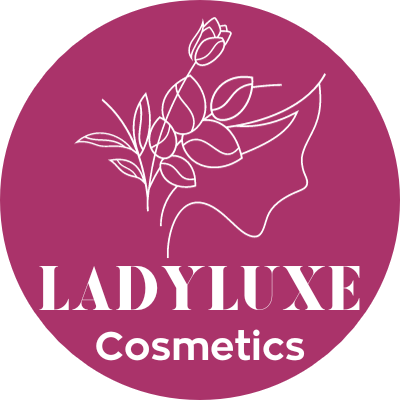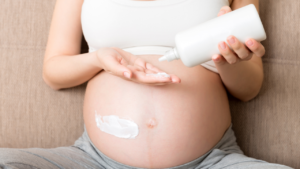Pregnancy is a beautiful journey that brings about many changes in a woman’s body, including her skin. As hormones fluctuate, expectant mothers often experience acne, sensitivity, pigmentation, and increased skin dryness. This makes it essential to establish a safe and effective maternity skin care routine to ensure optimal skin health during pregnancy.
When it comes to pregnancy-safe skincare, Dr. Mahsa Saleki, a renowned dermatologist, advises avoiding certain ingredients such as salicylic acid and retinoids. Instead, she emphasizes the importance of hydration and using products that are gentle and safe for both mom and baby.
Key Takeaways:
- Maternity skin care routine is crucial for maintaining healthy skin during pregnancy.
- Avoid ingredients like salicylic acid and retinoids in skincare products.
- Focus on hydration and using gentle, pregnancy-safe skincare products.
- Vitamin C serum can help reduce hyperpigmentation.
- Choose sunscreens with high SPF and UVA protection to combat sensitivity to sunlight.
Dealing with Pigmentation: The ‘Mask of Pregnancy’
Pregnancy can often bring about a skin condition known as melasma, commonly referred to as the “mask of pregnancy.” This condition is characterized by the appearance of hyperpigmented patches on the face, particularly on the cheeks, forehead, and upper lip. While melasma is harmless and typically resolves after childbirth, many expectant mothers may seek ways to minimize its appearance.
To combat melasma and reduce hyperpigmentation, it is crucial to protect the skin from the sun’s harmful rays. Using a pregnancy-safe sunscreen with SPF 30 or higher and broad-spectrum UVA/UVB protection can help prevent further darkening of the affected areas. Look for mineral sunscreens that contain zinc oxide, as they are considered safe for pregnancy.
“The best way to prevent and treat melasma during pregnancy is to use a broad-spectrum sunscreen daily and practice sun protection measures, such as wearing a wide-brimmed hat and seeking shade when the sun is at its peak,” advises dermatologist Dr. Julia Thompson.
In addition to sun protection, there are skincare products that can help address hyperpigmentation. Antioxidant serums containing vitamin C, such as SkinCeuticals’ CE Ferulic, can help reduce the appearance of dark spots and even out skin tone. Alpha hydroxy acids (AHAs) like glycolic and lactic acids can also be beneficial in treating hyperpigmentation. It is important to note that results may vary, and consulting with a dermatologist is recommended for personalized advice.
Treatment Options for Melasma
Here is a comparison of some commonly recommended treatment options for melasma:
| Treatment | Description | Effectiveness | Precautions |
|---|---|---|---|
| Topical Hydroquinone | A skin-lightening agent that inhibits the production of melanin | Can be effective in lightening dark spots | Should be used under the guidance of a dermatologist due to potential side effects |
| Chemical Peels | Exfoliating treatments that use acids to remove the top layer of skin | Can improve skin texture and reduce hyperpigmentation | May cause skin irritation and should be performed by a qualified professional |
| Laser Therapy | Uses laser technology to target and destroy melanin-producing cells | Can provide significant improvement in melasma, but multiple treatments may be required | May cause temporary redness, swelling, and skin sensitivity |
It is important to note that certain treatments may not be suitable during pregnancy or while breastfeeding. Consulting with a dermatologist is essential to determine the safest and most effective treatment options for individual cases.
Managing Hormonal Acne
Pregnancy hormones can lead to breakouts, especially around the chin, jawline, and cheeks. It can be frustrating and challenging to deal with acne during this time. While some acne-fighting ingredients like retinol and salicylic acid are not recommended during pregnancy, there are alternative options that can help manage hormonal acne.
Table: Safe Acne Products for Pregnancy
| Ingredient | Safety |
|---|---|
| Benzoyl Peroxide | Considered safe in limited amounts |
| Azelaic Acid | Considered safe in limited amounts |
Gentle exfoliation is one way to unclog pores and prevent future breakouts. Alpha hydroxy acids (AHAs), such as glycolic and lactic acid-based products, can help remove dead skin cells and promote cell turnover. These ingredients are generally safe to use during pregnancy. However, it is always recommended to consult with a healthcare professional or dermatologist before introducing any new products into your skincare routine.
Quote: “AHAs like glycolic and lactic acids can help exfoliate the skin gently, keeping the pores clear and preventing new breakouts.” – Dr. Jennifer Carter, Dermatologist
When it comes to treating existing acne and reducing blemishes, benzoyl peroxide and azelaic acid can be effective options. However, it is important to use them in limited amounts and follow the recommendations of your healthcare provider. These ingredients can help kill bacteria and reduce inflammation, promoting clearer skin.
To ensure the safety of both you and your baby, always prioritize gentle and pregnancy-safe skincare products. Avoid harsh ingredients and stick to a consistent skincare routine that includes gentle cleansing, moisturizing, and sun protection. Remember to consult with a healthcare professional or dermatologist for personalized advice on managing hormonal acne during pregnancy.
Addressing Heightened Sensitivity
Pregnancy hormones can increase skin sensitivities, causing reactions to certain products and heightened sensitivity to the sun. It is crucial to adopt a skincare routine that focuses on calming and soothing the skin during this time. By using the right products and avoiding potential irritants, expectant mothers can effectively manage the heightened sensitivity and maintain healthy skin.
Calming Skincare Products
When dealing with skin sensitivity during pregnancy, it is important to choose skincare products that are specifically formulated to calm and soothe the skin. Look for products with ingredients such as aloe vera, chamomile, and oatmeal, as they are known for their calming properties. These ingredients can help reduce redness, inflammation, and irritation, providing relief to sensitive skin.
Fragrance-Free Skincare
Fragrances can often be a common trigger for skin sensitivity. Therefore, opting for fragrance-free skincare products is highly recommended during pregnancy. Fragrance-free products are formulated without added scents or essential oils, reducing the risk of potential irritation. Additionally, it is important to check the ingredient list for any hidden fragrances or fragrance-related compounds that may be present in the product.
Minimizing Irritation and Maintaining Hydration
Aside from using calming and fragrance-free skincare products, there are other steps that can be taken to minimize skin irritation and maintain hydration. Avoid using products that contain alcohol or harsh chemicals, as they can further exacerbate sensitivity. Instead, opt for gentle cleansers, moisturizers, and serums that are specifically designed for sensitive skin. Additionally, it is important to drink plenty of water and keep the skin well-hydrated to prevent dryness and further sensitivity.
| Skincare Tips for Addressing Skin Sensitivity During Pregnancy |
|---|
| Choose skincare products that are formulated to calm and soothe the skin. |
| Opt for fragrance-free skincare products to reduce the risk of irritation. |
| Avoid using products that contain alcohol or harsh chemicals. |
| Drink plenty of water and keep the skin well-hydrated to prevent dryness. |
Dealing with Increased Redness
During pregnancy, many women experience increased redness in their skin, particularly in the face. This is due to the increased blood volume and hormonal changes happening in the body. While this redness is a common occurrence, there are skincare products and routines that can help soothe the skin and reduce redness. Calming skincare products specifically designed to address redness can provide relief and promote a more even complexion.
Anti-Redness Skincare
When dealing with increased redness during pregnancy, it is important to choose calming skincare products that are gentle and non-irritating. Look for products that contain ingredients known for their anti-inflammatory properties, such as green tea extract, chamomile, and aloe vera. These ingredients can help reduce redness and soothe the skin.
In addition to using calming skincare products, incorporating a refreshing face mist into your skincare routine can help cool the skin and provide instant relief. Look for a mist that contains ingredients like rosewater or cucumber extract, known for their soothing and calming effects.
Quote: “Using a refreshing face mist and anti-redness skincare products can help soothe the skin and reduce redness.”
Recommended Skincare Brands
Several skincare brands offer products specifically formulated to regulate and calm redness. Some popular options include Bioderma, Ren, Dr.Jart+, and Clinique. These brands have developed skincare ranges that target redness and provide effective solutions for managing this common pregnancy skin concern.
| Skincare Brand | Product Range |
|---|---|
| Bioderma | Sensibio Anti-Redness Range |
| Ren | Evercalm Anti-Redness Range |
| Dr.Jart+ | Cicapair Tiger Grass Range |
| Clinique | Redness Solutions Range |
When incorporating anti-redness products into your skincare routine, it is always important to patch test first and consult with a dermatologist if you have any concerns or existing skin conditions.
Managing Drier Skin During Pregnancy
Pregnancy can often lead to drier skin due to hormonal changes and increased water retention by the body for the baby’s development. It is important for expectant mothers to take steps to keep their skin hydrated and nourished.
Hydrating Skincare Products
Using moisturizing creams and oils can help replenish lost moisture and keep the skin supple and hydrated. Look for products with ingredients like hyaluronic acid, which has excellent water-retaining properties. Hyaluronic acid works by attracting moisture to the skin, helping to alleviate dryness and promote a healthy glow. Other beneficial ingredients include glycerin, ceramides, and shea butter.
Omega-rich oils like rosehip oil can also be beneficial in providing nourishment and hydration to dry skin. These oils are packed with essential fatty acids that help strengthen the skin barrier and lock in moisture. Apply a few drops of oil onto damp skin after cleansing to seal in moisture and maintain hydration throughout the day.
“Using moisturizing creams and oils can help replenish lost moisture and keep the skin supple and hydrated.”
Moisturizing Creams
When choosing a moisturizing cream, opt for a formulation specifically designed for dry skin. Look for creams that are rich in emollients and humectants to provide a deep moisturizing effect. Avoid products with harsh chemicals and fragrances that can potentially irritate the skin.
Apply the moisturizer to clean, dry skin in gentle circular motions, focusing on areas that are prone to dryness. It is recommended to moisturize the skin at least twice a day, especially after showering or bathing when the skin is more receptive to hydration.
| Product | Key Benefits |
|---|---|
| 1. Cetaphil Moisturizing Cream | – Intense hydration – Suitable for sensitive skin – Fragrance-free |
| 2. Aveeno Daily Moisturizing Lotion | – Non-greasy formula – Absorbs quickly – Soothes and hydrates dry skin |
| 3. La Roche-Posay Lipikar Body Lotion | – Restores skin barrier – Long-lasting hydration – Suitable for all skin types |
Note: Consult with your healthcare provider before trying any new skincare products during pregnancy to ensure they are safe for your specific needs.
Skincare Ingredients to Avoid During Pregnancy
During pregnancy, it is important for expectant mothers to be mindful of the skincare ingredients they use. Certain ingredients have the potential to harm both the mother and the baby. To ensure a safe skincare routine, it is recommended to avoid the following harmful skincare ingredients:
- Retinol and retinoids: These Vitamin A derivatives can increase the risk of birth defects when used topically or orally.
- Hydroquinone: This ingredient, commonly used for skin lightening, should be avoided as its safety during pregnancy is uncertain.
- Phthalates: Found in perfumes and nail polishes, phthalates may have links to birth defects and should be avoided.
- Formaldehyde: Often present in nail products and hair straightening treatments, formaldehyde is a known carcinogen and is best avoided during pregnancy.
- Toluene: Commonly found in nail polishes, toluene can be harmful when inhaled and should be avoided.
- Ammonia: Typically found in hair dyes, ammonia can also pose risks during pregnancy and is best avoided.
It is important to note that this is not an exhaustive list, and there may be other skincare ingredients to be cautious of during pregnancy. It is always best to consult with healthcare professionals and dermatologists for personalized advice and recommendations.
| Harmful Skincare Ingredients to Avoid During Pregnancy | Potential Risks |
|---|---|
| Retinol and retinoids | Increase the risk of birth defects |
| Hydroquinone | Safety during pregnancy is uncertain |
| Phthalates | Potential links to birth defects |
| Formaldehyde | Known carcinogen |
| Toluene | Harmful when inhaled |
| Ammonia | Potential risks during pregnancy |
“During pregnancy, it’s crucial to be cautious about the skincare ingredients you use. Avoiding harmful ingredients can help protect both you and your baby.” – Dr. Jane Smith, Dermatologist
Pregnancy-Safe Household Products
During pregnancy, it’s not just your skincare routine that needs attention – household products can also impact your health and the well-being of your baby. Switching to pregnancy-safe alternatives can help reduce exposure to harmful chemicals and create a safer environment for you and your growing family.
Pregnancy-Safe Laundry Detergent
When it comes to doing laundry, opting for a pregnancy-safe laundry detergent is essential. Traditional laundry detergents often contain harsh chemicals like phthalates, formaldehyde, and synthetic fragrances, which can be potentially harmful. Instead, choose non-toxic laundry detergents that are free from these harmful substances. Branch Basics is a great option, offering plant-based and non-toxic laundry detergent that is safe for you and your baby.
Non-Toxic Cleaning Products
Keeping a clean and tidy home is important, but it’s equally important to choose non-toxic cleaning products during pregnancy. Many conventional cleaning products contain chemicals like ammonia, bleach, and artificial fragrances, which can be harmful when inhaled or come into contact with the skin. Opt for plant-based and non-toxic cleaning products, such as those offered by Branch Basics, to ensure a safer cleaning routine for you and your baby.
Pregnancy-Safe Deodorant
While personal hygiene is important, it’s essential to choose a pregnancy-safe deodorant that doesn’t contain harmful ingredients. Many conventional deodorants contain synthetic fragrances, aluminum compounds, and other potentially harmful chemicals. Look for pregnancy-safe deodorants that are free from these ingredients and provide long-lasting odor protection. Nécessaire offers a range of pregnancy-safe deodorants that are effective and gentle on sensitive skin.
By making simple switches to pregnancy-safe household products, you can create a healthier environment for yourself and your baby. Choosing non-toxic laundry detergents, cleaning products, and deodorants ensures that you’re minimizing your exposure to harmful chemicals during this crucial time. Remember to always read labels and opt for products that prioritize safety and transparency.
Beauty Procedures and Practices to Consider
During pregnancy, it’s essential to approach beauty procedures and practices with caution to ensure the well-being of both the expectant mother and the baby. While many beauty treatments are safe, there are a few that require closer consideration. Let’s take a closer look at three common beauty procedures: dyeing hair, spray tanning, and chemical hair treatments.
Dyeing Hair During Pregnancy
The safety of dyeing hair during pregnancy has long been a topic of debate. While there is limited research on the topic, some studies suggest that the chemicals in hair dyes may be absorbed into the bloodstream and potentially reach the fetus. It is generally recommended to avoid chemical hair treatments, including bleaching, during the first trimester when the baby’s organs are developing. However, as the pregnancy progresses and the risk decreases, you can discuss safe hair dye options with your healthcare provider or a trusted hairstylist.
Spray Tanning When Pregnant
When it comes to spray tanning during pregnancy, there are a few considerations to keep in mind. While the active ingredient in most spray tans, DHA (dihydroxyacetone), is generally considered safe for external use, there is limited information on its safety when inhaled or absorbed through the skin. Additionally, some spray tan solutions may contain other chemicals that are best avoided during pregnancy. It is advisable to check the ingredients of the spray tan solution and inquire with your healthcare provider before getting a spray tan while pregnant.
Chemical Hair Treatments
Chemical hair treatments, such as perms and relaxers, often utilize strong chemicals that can be absorbed through the scalp and potentially affect the baby. It is recommended to avoid these treatments during pregnancy, especially during the first trimester. If you are considering a chemical hair treatment later in your pregnancy, consult with your healthcare provider to assess the risks and explore safer alternatives.
Remember, every pregnancy is unique, and it’s always best to consult with your healthcare provider before undertaking any beauty procedures or practices during pregnancy. They can provide personalized advice based on your specific situation and help ensure a safe and healthy experience.
| Procedure | Safety Tips |
|---|---|
| Dyeing Hair During Pregnancy | Avoid chemical hair treatments during the first trimester. Consult with your healthcare provider for safe options later in pregnancy. |
| Spray Tanning When Pregnant | Check the ingredients of the spray tan solution and consult with your healthcare provider before getting a spray tan while pregnant. |
| Chemical Hair Treatments | Avoid chemical hair treatments, such as perms and relaxers, during pregnancy. Consult with your healthcare provider for safer alternatives. |
Conclusion
Developing a maternity skin care routine is crucial for maintaining healthy and glowing skin during pregnancy. By prioritizing safe skincare during pregnancy and embracing natural skincare options, expecting moms can ensure the well-being of themselves and their little ones.
During pregnancy, it’s essential to avoid harmful ingredients that could potentially harm the baby. By opting for pregnancy-safe skincare products and avoiding ingredients like retinol, hydroquinone, and certain essential oils, moms-to-be can protect their skin while nurturing their growing baby.
Hydration is key during pregnancy, and expectant moms should focus on incorporating hydrating ingredients like hyaluronic acid and vitamin C into their skincare routine. By keeping the skin nourished and moisturized, moms-to-be can combat dryness and maintain a healthy, radiant complexion.
Consulting with healthcare professionals and dermatologists is always recommended for personalized advice on pregnancy-safe skincare. They can offer expert guidance tailored to individual needs, ensuring that the maternity skin care routine is safe and effective for both mom and baby.
FAQ
What changes can pregnancy bring to the skin?
Pregnancy can bring about changes in the skin, such as acne, sensitivity, and pigmentation.
Are there any skincare ingredients to avoid during pregnancy?
Yes, it is advised to avoid ingredients like salicylic acid, retinoids, hydroquinone, and all retinol products.
How can I reduce hyperpigmentation during pregnancy?
Using a vitamin C serum and alpha hydroxy acids like lactic and citric acids can help reduce hyperpigmentation.
What should I do to manage hormonal acne while pregnant?
Retinol and salicylic acid should be avoided, but gentle exfoliation with AHAs and products containing benzoyl peroxide and azelaic acid in limited amounts can help manage hormonal acne.
How can I address heightened sensitivity during pregnancy?
Using a broad-spectrum mineral sunscreen, avoiding fragrances in skincare products, and choosing calming masks and gentle moisturizers can help minimize skin irritation.
What can I do to reduce increased redness in the skin during pregnancy?
Using a refreshing face mist and anti-redness skincare products can help soothe the skin and reduce redness.
How can I manage dry skin during pregnancy?
Eating water-rich foods, using moisture-retaining ingredients like hyaluronic acid, and applying omega-rich oils can help hydrate and nourish dry skin.
Which skincare ingredients should I avoid during pregnancy?
Retinol, hydroquinone, all retinoids, phthalates, formaldehyde, toluene, ammonia, and certain essential oils like basil, rosemary, and peppermint should be avoided during pregnancy.
Are there any pregnancy-safe household products I should consider?
Switching to non-toxic laundry detergents, using non-toxic cleaning products, and avoiding synthetic fragrances can contribute to a safer home environment.
What beauty procedures should I be cautious about during pregnancy?
Chemical hair treatments and bleaching are generally recommended to be avoided during the first trimester. Spray tanning is also uncertain, and it’s best to check for potential inhalation effects and ingredients before getting a spray tan while pregnant.
You may also be interested in
Effective Body Skin Care for Women: Uncover Your Vibrant Glow
Effective Hair Treatment for Women – Revitalize Your Locks Today!
Unlock the Secret to Healthy Skin with Our Hand Care Guide
Unlock Your Youth: Anti-aging for Women Strategies Revealed
How to Take Care of Your Lips Naturally: Essential Tips
Source Links
- https://www.harpersbazaar.com/uk/beauty/skincare/news/a42682/pregnancy-skincare-guide/
- https://www.ambitiouskitchen.com/pregnancy-skincare-routine/
- https://www.ipsy.com/blog/pregnancy-skincare-routine






